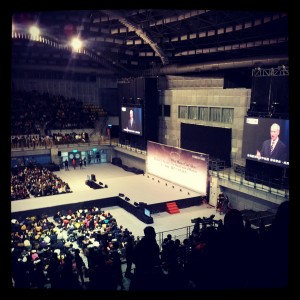Goodbye England…
So I’m in the first week of my new adventure; starting a new life in Taiwan. I might blog a bit about life here – but perhaps I’ll do that elsewhere, as it doesn’t really link in with Skepticism and Atheism. I might try to join a skeptic group, if they have them here. There’s a lot of (apparently benign) superstition over here, usually involving horoscopes and lucky numbers. I hear that Christianity is the most common Abrahamic religion (Islam is practically non-existent here), but by far most people are Buddhist. There are quite a few examples of Westerners starting schools and hospitals in Taiwan, and perhaps I could start my own atheist group!
Morals & Markets
On the second day here, I went to a lecture by Harvard professor Michael J. Sandel, called What Money Can’t Buy: The Moral Limits of Markets. In fact, it wasn’t really a lecture; more of a seminar as most of it was taken up with the audience members giving their opinions. Sandel posed moral questions, and we were asked to vote by showing either the cover or the inside of our programmes. He then invited individuals to justify their decision to the audience. It reminded me of a university philosophy seminar, only the size of the auditorium made it less involving (Sandel is a bit hit in Asia).
The questions were things like “is it fair for a seller of snow shovels to raise the price in a snow storm?” and “is ticket scalping fair? For rock concerts? For train tickets at Chinese New Year? For philosophy lectures?” (apparently there is scalping at Sandel’s events!), and “is it fair that a larger corporation eats its competition? What about a large corporation owning a large portion of the media?” (this is a hot issue in Taiwan right now).
Sandel’s central point seemed to be this: there are differing opinions about where the ‘moral limits’ of markets lie, and various arguments backing up each side. So economic questions are inseparable from moral questions, contrary to the prevailing opinion that economic questions are separate from moral questions. I found this a slightly puzzling way of putting it. I agree with Sandel that there certainly are moral limits, but I’d have said that the fact that we understand the economics wholly apart from moral considerations means that in fact they are separate. Take for instance the question about snow shovels. If the seller puts the price up during a snowstorm, this is because the demand has risen, and the seller is doing the sensible thing from an economic point of view. It makes complete sense when we only consider economics. I showed the cover of my programme when Sandel asked this, as I believe it is unfair when considered from a moral perspective, and yet I understand the economic compulsion to raise the price. Why is it unfair? Well, the demand has risen, but it is also a need. The seller is exploiting a bad situation for everyone to cash-in for personal gain. When we consider that a just society desires that the needs of the people are satisfied by fair distribution, it seems to me that a basic need like a snow shovel in a snow storm should not be distributed according to how rich someone is. Anyway, that’s an aside. The economic question is separate from the moral question in my view.
I don’t think this is a substantial disagreement with Sandel though. He seemed to be saying that economic issues are bound up with moral issues, so we should always consider the moral when thinking of the economic, and how our society should proceed economically. That is certainly my view – I’d rather that the overall wealth was lowered if it meant that there was nobody in absolute poverty, for instance.
What was Sandel’s argument for this view? That was the problem I had with his format. Almost all of Sandel’s time was taken up with the views of the audience members, with Sandel merely acting as a stimulus for discussion. That’s admirable of course – we should think of ideas for ourselves, and argue together rather than preach. The trouble is, a lot of the arguments given by the audience members were fallacious. For example, on the question of competition being eaten by large corporations: “I bet all of you complaining about the large corporation would have shopped there instead of the smaller business!”. This meant that I didn’t really learn much from them, and was much more interested in what someone like Sandel had to say – unfortunately his own arguments weren’t really presented. The only argument for his view that there are moral limits to markets is that we’re all disagreeing and civilly discussion where those limits lie. However, that didn’t seem to follow. There were always those supporting the “it’s fair” approach, even on the idea of media monopoly. One argument presented for this was that they’ve got the money to buy it, it’s legal for them to buy it, so it’s fair. Now, either that’s wrong or it contradicts Sandel’s view that we shouldn’t simply look for the economic answer. I suspect that Sandel’s argument wouldn’t have been enough to convince someone who showed the inside of their programme for every question. Of course, I’m a far left loon so I showed the cover of my programme for every question!
I think I’ll read his book on the matter. It was a very optimistic lecture, and he concluded by saying that we can all have a civil and open discussion about the moral questions in economics, which I’d like very much. However, I’m a pessimist. These arguments are far more frequently settled with guns and bombs than they are with a civil and open discussion.

